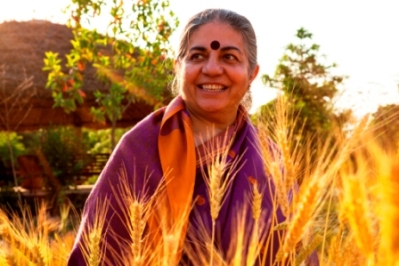Farmers Suicides in India: What Is Causing Them, And What Can Be Done To Stop The Tragedy

This week, on 22 April, Gajendra Singh committed suicide. At an Aam Aadmi party protest against the Land Grab Ordinance, the 41 year old year old farmer travelled from his small village in Rajasthan to the rally in Delhi, where he took his life. He travelled all the way so that his story could be heard.
In his death, Gajendra joined the nearly 300,000 Indian farmers who have committed suicide since 1995. Farmers whose stories – unlike Singh’s – have been silenced.
22 April was Earth Day. It should be a day to honour the keepers of the Earth and the guardians of the soil – our farmers, our Annadatas, those who give us food by working with the Earth. Instead, it became a stark reminder of how we have betrayed those who feed us.
Gajendra’s public suicide at a political rally took me back to Cancún, Mexico in 2003 at the WTO protests, where Korean farmer Lee Kyung Hae climbed a fence and committed suicide. He was wearing a sign that read “WTO Kills Farmers” It was a reminder of one of the worst genocides of our times – the genocide of small farmers at the hands of globalization.
The public suicides of both Gajendra and Lee were calls for society to wake up to the structural violence enacted against small farmers through policies of industrial agriculture and corporate-led trade liberalization. Enabled by these policies, corporations reshape agriculture to maximize their profits, and across the world, farmers die of debt and vulnerability, and children die from hunger and malnutrition.
In 1995, Indian Agriculture was reoriented from being focused on National Food Security, which rests on the livelihood and ecological security of our small farmers, to being focussed on corporate control and corporate profits, which are made possible by the corporate written rules of “free” trade, trade liberalization, and globalization. Enabled by these rules, agrichemical giants entered India and started to control the seed sector. Where once farmers grew, saved, and replanted seeds, they were now forced to buy seed-chemical packages that allowed companies to extract super-profits from farmers through royalty collection.
The high costs of seed trapped farmers into a vicious cycle of debt, and debt-trapped farmers began to commit suicide – beginning with India’s cotton areas, such as Vidharba. In these cotton growing regions, commercial cotton seed prices skyrocketed because non-GM cotton seeds were withdrawn by seed companies in favour of GMO Bt-Cotton.
In 2009 alone, 30 new brands of Bt Cotton were introduced in India in order to create an illusion of choice for farmers. In reality, the introduction of Bt cotton meant that farmers could no longer afford seeds and were forced to buy them on credit from companies, creating a cycle of debt that continues till today.
This year, the suicides spread to Northern India. 16 farmers of West Bengal who shifted from rice cultivation to growing potatoes for Pepsi. Co. committed suicide in March 2015. Pepsi makes money by buying potatoes from farmers at low prices, while selling them costly chemical inputs. Less than 2% of what we pay for a packet of Lays chips reaches the farmer. Corporate controlled agriculture is designed for maximizing corporate profits at the cost of farmers’ incomes and livelihood security.
In prosperous West UP, sugarcane farmers started to commit suicide because sugar mills were not paying them. More than Rs 5000 crore (50 billion) is owed by the mills to the farmers. In spite of a Supreme Court order to pay the arrears, the government is failing to bring justice to the farmers because several politicians are close to the mill owners. In spring 2015, during the harvest festival of Baisakhi, more than 100 farmers of West UP committed suicide. Their crops had failed due to unseasonal rains. This climate instability is part of climate change, and industrial agriculture is a major driver of climate change. Farmers’ suicides are a result of high cost-low return farming, the stresses due to the debt resulting from this exploitative system, their vulnerability to volatile markets, and a chaotic climate.
Our food system needs to change. Ecological agriculture, seed sovereignty, and climate resilient strategies form the roadmap for this change. At Navdanya, we are seeing it happen. We are sowing the seeds of debt free, organic, and climate resilient farming, where farmers are growing more food and more nutrition, their net incomes are increasing, and their crops are less prone to failure.
In the weeks and months following Earth Day, let us come together to demand justice for our farmers – the growers of our food, the guardians of our soil. Let us remember Gajendra, Lee, and the hundreds of thousands of farmers who have died at the hands of corporate greed; let us make sure that their stories are heard.
Vandana Shiva is a philosopher, environmental activist, and eco feminist.Shiva, currently based in Delhi, has authored more than 20 books and over 500 papers in leading scientific and technical journals.She was trained as a physicist and received her Ph.D. in physics from the University of Western Ontario, Canada. She was awarded the Right Livelihood Award in 1993. She is the founder of Navdanya http://www.navdanya.org/

